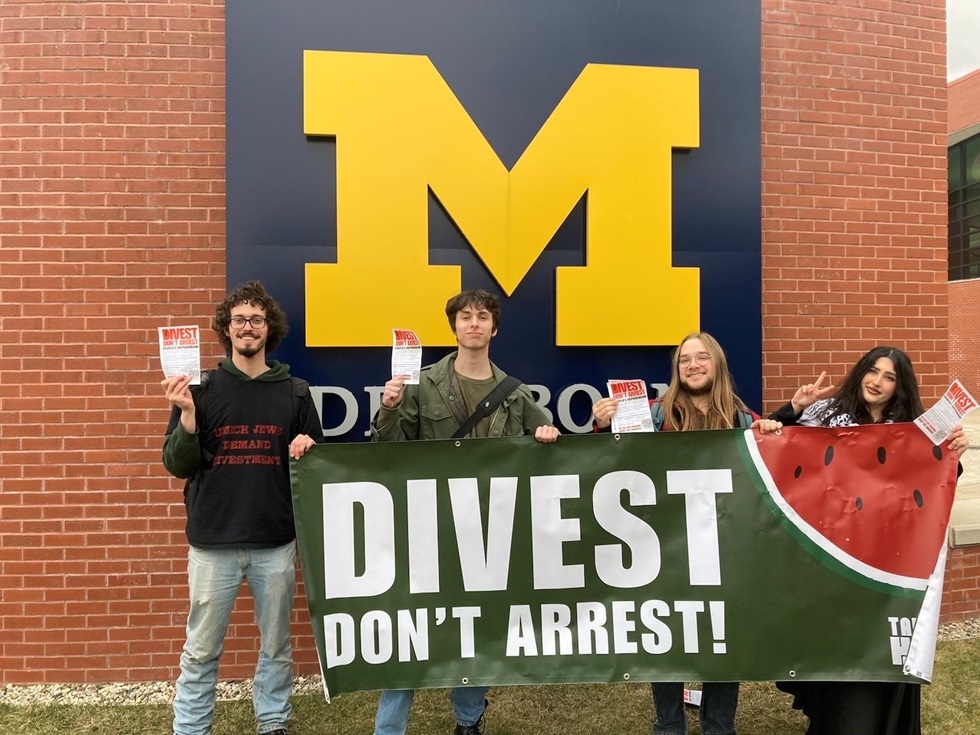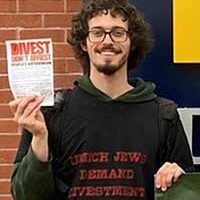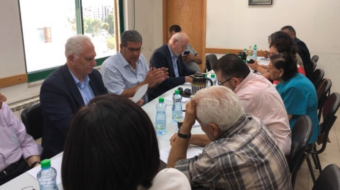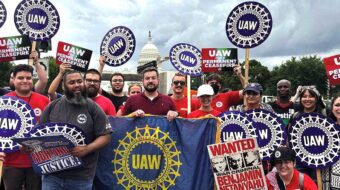
ANN ARBOR, Mich. — Braving the cold on Feb. 15 students and trade unionists gathered in front of the University of Michigan’s Ruthven Administration Building to launch a campaign to push the University to divest from genocide. Nearly $6 billion of the University’s $18 billion endowment is invested in private equity, and venture capital firms that own stakes in U. S. military contractors and Israeli companies complicit in the ongoing genocide in Gaza, according to rally speakers.
Launched the day of the rally, the Divest Don’t Arrest (DDA) campaign is a plan to force the University’s Board of Regents to divest from the Israeli government, its military, its companies, and U.S. military contractors producing weapons used in the ongoing genocide. Spearheaded by the TAHRIR Coalition, the DDA campaign encompasses all students, faculty, staff, and hourly workers at the UMich Ann Arbor, Dearborn, and Flint campuses to push for university action in solidarity with Palestine.
The TAHRIR Coalition was initiated by Students Allied for Freedom and Equality (SAFE), an organization founded in 2002 to advocate for university divestment from Israel and justice for Palestinian students. The TAHRIR coalition includes over 70 student organizations ranging from sororities and fraternities to the Black Student Union. Notably, the coalition includes Jewish Voice for Peace UMich, an anti-Zionist Jewish organization, and the Graduates Employees Organization Local 3550 (GEO), the graduate student workers union.
The campaign’s first stage is a People’s Referendum on divestment from Israel. Kathleen Brown, a member of GEO, described the referendum as “an attempt to exercise democracy for those affected by the university.”
“The people’s referendum is kind of a popular ballot, a popular vote if you will, across all of the University of Michigan. The end goal of course is not the vote in itself… This isn’t the bosses’ democracy where we’re electing a particular representative, or we think democracy is simply only done at the ballot box. This is an attempt to move towards collective power by using this referendum.”
Last fall the university administration canceled a referendum called by the Central Student Government (CSG) asking the university to condemn Israel’s genocide of Palestinians and to investigate divestment. University leadership took the additional step of permanently barring CSG from calling for another referendum. The People’s Referendum responds to this controversial and unpopular decision by the UM Board of Regents and University President Santa Ono.
Salma Hamamy, president of SAFE, explained how the TAHRIR coalition’s People’s Referendum differs from a CSG referendum:
“The CSG ballot is limited to just students, whereas ours will be much more flexible, much more inclusive, we’re going beyond just students, and we’re going beyond the Ann Arbor campus. This is meant to be far more encompassing and reflective of the public. It’s meant to be for us, and it’s written by us, and it’s going to serve us because CSG and the university institutions have ultimately failed us.”
Brown explained why instead of trying to overturn the University administration’s decision to ban all future CSG resolutions that call for divestment from Israel, the TAHRIR coalition decided to hold a People’s Referendum.
“The fact that the university administration can unilaterally cancel a student vote tells us that there’s really no democracy behind it. A People’s Referendum is a grassroots alternative to that… What’s important is that the movement is running it ourselves. This is not something that can be canceled by the university. The goal of the People’s Referendum is to organize our coworkers and our classmates in support of divestment wherever we are.”
Organizing UM faculty, staff, and student workers is crucial for the DDA campaign, said Brown, who shared how union organizing skills effectively translate to building the movement for divestment from genocide.
“The first thing is finding all the people who are in favor of divestment, getting in touch with them, talking with them, and asking them to be part of this movement. What action comes next…people will need to decide together. But we’ve seen that getting the University to stand against the genocide that so far nothing has worked, people have really been throwing themselves in front of the machinery of war and it has not worked, so this is trying to get mass support, mass movement, and ideally, mass disruption.”
The DDA campaign also takes the university to task for its decision to arrest 41 students at a peaceful sit-in that the TAHRIR Coalition organized. The arrested students had demanded that UM President Ono meet to discuss divestment after he ignored numerous requests to meet. Two additional activists were later arrested. University administration requested that Washtenaw County Prosecutor Eli Savit press charges, including felony charges, against the peace protesters. While Ono has met with Michigan Hillel, a campus Zionist organization, he continues to refuse to meet with the TAHRIR Coalition.
The Coalition is mobilizing people to call the prosecutor’s office to get the charges against the arrested students dropped and to apply pressure on their office not to prosecute students or criminalize students in engaging in political protest, said Hamamy.
The TAHRIR Coalition’s struggle against apartheid and genocide continues a long tradition of UM student activists fighting the Board of Regents for justice against oppression. In 1970, the Black Action Movement carried out an 18-day UM campus strike that forced the university administration to call for increased African-American enrollment. Many campus activists and organizers later pressured the Board of Regents and the Michigan state government to divest public university funds from South Africa. Since 1989, students have been working to get the university to divest from Israel. The TAHRIR Coalition is confident that their efforts will ultimately succeed.
“We really need to be thinking about where the war machine is being fed, how we can disrupt that,” Brown said.
We hope you appreciated this article. At People’s World, we believe news and information should be free and accessible to all, but we need your help. Our journalism is free of corporate influence and paywalls because we are totally reader-supported. Only you, our readers and supporters, make this possible. If you enjoy reading People’s World and the stories we bring you, please support our work by donating or becoming a monthly sustainer today. Thank you!












Comments